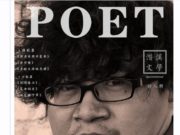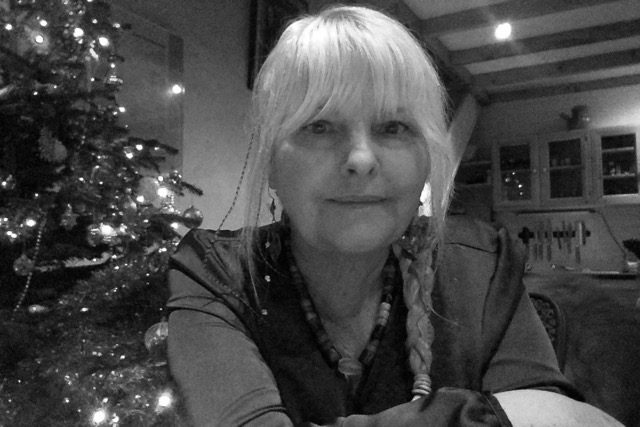Originally from the Ubaye Valley in the French Alps, half-way between Provence and Piedmont, Michèle Vassal moved to Ireland in her late teens.
In 1999, she won the Prize for a First Collection at Listowel Writers Week, since then her poems have been appeared in many journals and anthologies and she is frequently invited to read her work at festivals and events in Ireland and abroad.
Her two collections – Sandgames (2000) and A Taste for Hemlock (2011) are both published by Salmon Poetry.
Some of her poems have been adapted to music, most notably by legendary Skid Row guitarist Jimi Slevin and acclaimed Irish singer/songwriter, the late Martin Egan.
She is also an artist and has designed CD and book covers.
She currently lives, near Bantry (Ireland), with her husband, the piper/harper Brendan Ring. They are currently working together on some recordings using traditional Irish instruments and contemporary verse.
Her poems can be found in – The Cork Literary Review (issues 4,5,6 and 16), Podium 3, Samhlaich Chairrri, Cùm, The Stinging Fly, Books Ireland, The Kerry Anthology, Poets for the Millenium, The Sunday Tribune (New Irish Writing), Leaves, Fish, 10k Poets, Mslexia, Cosmos Review, The Café Review, Gloom Cupboard, Bare Hands, Patte de Chat, The French Literary Review, A Journey in Poetry, Dogs Singing, Blue Max, Poetry Bus, Even The Day Break, Poetry Monthly International, The Sea, Visions, On the Banks.
She received 1st prize at the Listowel’s Writers Week and was short listed for the Hennessy/Tribune awards, New Irish Writing.
Shortlisted also – in French, for ‘La Fureur du Noir’ and in English (Fish Crime Fiction), for her criminally minded short stories.
Reviews for A Taste For Hemlock:
This is a book of consequences, but it is also a book of consequence, it matters.
Martin Egan
By far the best and most challenging collection of poems by a poet issued in 2011 is Michele Vassal’s, ‘A Taste For Hemlock’ (Salmon Poetry), with a cover by the author. Here is a European sensibility charging through the conventional staidness of much Irish contemporary work. It is richly to be hoped that this book receives the critical attention and promotion that it deserves; a book without decent promotion behind it by its publisher can often sadly wither and die. Ask for this book in bookshops or chase it up online.
Fred Johnston – Western Writers’ Centre
…There’s a Baudelairean sensibility and aesthetic at work in A Taste for Hemlock, a delight in and of the senses, a savouring and appreciation of all that the wide world has to offer, and the bitter flavour attendant on wisdom. There’s also an understanding that the brightest moment of an object’s life, whether that be an animal, plant or fruit, or even a human, is just before the turning point of decay or a bruise; but that this is cyclical and to be anticipated is one of our consolations for loss…
Alan Garvey- Gloomcupboard
A Taste for Hemlock, is a mystical journey of transmutation birthed in the crucible of cultural dichotomy. Grounded in myths and storytelling, Michèle Vassal’s vision is uncompromising, incisive, and laden with a rich painterly sensuality. In this book, she unravels, with honesty and sensitivity, the golden thread that runs through personal and collective memory, honouring both the frailties and beauty of our humanity. Each section, indeed each poem is like a way-station in the development of the human spirit enduring and then emerging from incredible adversity into true identity and ability in all its different guises. It has been said that beauty has nothing to do with being pretty. This book bears that out completely. And it still manages to be mythic, absorbing and beautiful.
Martin Egan
Michele Vassal has the rare gift of turning poetry into music. Each elegant, spare, melodic verse lingers in the mind like a beautiful song.
Ferdia McAnna (Writer and Film Director)
The title poem “ a Taste for Hemlock” is a flawless sequence of short verse. It distils the complex, the communal drive to inevitable death at the end of a systemic melancholy thread.
“defining desire and death” a conceptual, movable verse, disperses its acquired wisdom beyond the dull ache of long pain, above the throb of ritualistic grief. The verdant background of the book cover, the glistening cerulean undertones understate pure, passionate, pleasure.
Nadine Sellers – Last Known Nest
Poems:
CUTTING THE SCEALLÁNS
A gritty rain falls on the City
on the Paps, and seven
ravens scry the entrails of
clouds for the deeds of heroes
and Tim cuts the scealláns.
The cuckoo’s spit
foams on blades of grass:
there might be blight
later in the year.
Tim sits by the range
talks in unfinished sentences
of mountain sheep
and mountain men
cups of tea and cigarettes
the bacon, newspaper wrapped
sways from the beige ceiling
he lifts his cap
shoves back an escaped comma
of hair the colour of old thatch
and tells you of blackthorn hedges
the evening light is the amber of
whiskey and stewed tea
he pulls out the box
from under the leatherette chaise longue
do you know this one?
and the notes stagger
on the edge of fields and bogs
like rain in August
they swell your heart.
Years later a tune
filled with turf smoke
and the voice of women
lingers on your fingers
and so you name it
‘cutting the scealláns’.
Cutting the scealláns is the process of dividing the potatoes before planting.
The City or Cahercrobdarrig is a stone ring fort below the Paps.
A Taste of Hemlock (Salmon)
BY SALLYPORT
It’s from Le Guilvinec, she would have said
on seeing the blue hull shudder on a tattered sea.
Heading for shelter. Must be bad.
Those from Concarneau and Douarnenez
will follow. Thirty years ago, she too
had found refuge from her storms here.
Since then, she had watched schooners and
Galway hookers and the bright dancing pods
of the fishing boats, the yachts sleek as
albatrosses, the catamarans and the Asgard
– sails like unwritten letters
whilst her lost son scoured the oceans.
Her life had weathered to peace by the time Frédéric
found her, binoculars in hand, still reading the sea.
She told me she had always known that the swell
would carry him to her shores again. And it did
on the darkest night of a winter equinox.
The boat’s white wake and the swollen surge
pulled her ashes back to the heart of a graphite sea.
There, the full moon elongated tide, slid its brine
over green pebbles of smashed beer bottles
over the minuscule exoskeletons of the sand
over the nail shaped shards of barnacles
over plankton and glassy shrimps
over undulating strands of kelp
over the yellow circumvolutions of a small snail.
My Mother the Viking, sailed to Valhalla
in the hair of mermaids, on the back of selkies
in a periwinkle shell, on a vessel from Le Guilvinech
Wave follows wave
and my grief is a flutter of spume
palpitating on the furze anchored in rock
just above the water mark, by Sally Port.
The Sea (Rebel Poetry)
UNDER THE DOG STAR
Anything can happen
when
dog days are unleashed upon July
when
by ten
the white heat
slaps you back indoors
with a flat
asphyxiating blow
when
afternoons snarl at you
from shadowless streets
when
light uncolours all hues
back to bone
when
shade is unspilled
unsecreted
trapped
behind shutters
anything can happen
when
you sit at the edge of stillborn
storms swollen and taut
veined with rivers
and the sky fails you
again
and again
anything can happen
and wine will sour on your tongue
and a boy will immolate his father
and the sea will boil black
A Taste of Hemlock (Salmon)
DANCING TOWARDS EVENING
I am a woman dancing
under a panther sky
that scrawls shadows
on the hip of hills
I am a woman dancing
towards evening
under my soles
the day
dust of tamarisk
rose-pink
stridulations of dittany
I am a woman dancing:
amber kompolois
around plane trees
spiralling Betelgeuse
under an appled moon
dancing
strings of steps
labyrinths
clusters of stars
I am a woman
dancing
my way home
A Taste of Hemlock (Salmon)
INTERVIEW BY NADINE SELLERS conducted during French interval
Somewhere in the South of France, a woman sits with white kitten on lap.
She holds a cup of chicorée and lifts her pensive eyes toward the fading autumnal fog. This is the writer, Michèle Vassal, sitting at an old garden table the color of sky, lost on the Causses du Quercy. She wears a bright pink top and tells me she feeds off the vibrancy, preferring a screeching palette to the ” bien-séance of cream and beige; though she does yearn for a white embroidered djellaba.
Her life, a poetic triptych, she collates the multilingual pages on a mystical journey, verse by verse. To quote her accomplishments would diminish the sensual quality of her sensitive vision; a fine sculpture which allows sparse lines and precise cuts to show the essential nature of a subject. This is where we find the selected daughter of Irish literature.
“Spat out on the shores of night
A girl like a shell”
Michèle Vassal takes us on a languid journey through languages and serves the polymorphous muses of past and present on a tapestry of elegance and passion. I enjoy the side trips which ultimately lead to a more accurate vision of the writer than any preconceived question. That’s why i will not call them questions, but conversation.. The interplay between mood and mind. Brief phrases are not static, it’s a virtual salon happening, not the great inquisition between us.
Allons-y!
MV: I feel that my writing is born of exiles. That could be a starting point I guess. This is exciting! I believe that i would like to begin with cultural and linguistic background. I am so used to speaking my life through metaphor, paring down, condensing sentences.
NS: Michele, do you remember when your native language came to life for you as nascent poetry.
MV: Languages are the weft around which my life wove itself, from the guttural Algerian that is the backdrop for my earliest memories, to the Hiberno-English that I so love.
French, for me, was primarily the language of reading and by Gosh did I devour books, but it was also that of communication, of emotions and for what seemed a very long time, those were mostly painful, which is why, I guess, I abandoned it so willingly.
When did the language come to life? It’s very difficult to pinpoint, honestly I don’t know, it is, hopefully, still an ungoing process. I remember age 7 or so, making little books, whose pages I bound with a red cotton stitch and on which I wrote poems which I also illustrated: invariably they were about stars, bleeding sunsets and princesses – I am not sure I have evolved that much since!
NS: Reading has formed a solid base under your movable spirit.
Gradually I fell in love with certain authors, Antoine de Saint Exupéry, Colette, Materlinck whose writings accompanied me from childhood to teenage. But my first real contact with poetry (I exclude the compulsory learning of Lafontaine Fables at school) was with Rudyard Kipling’s IF regularly recited – in English- and translated my father whenever I indulged in unseemly emotional displays (usually around school report time). And so I grew up to the dictate “ you’ll be a man my son”, not only did I survive it but I even got to like it 🙂
Then sometime around the age of thirteen, I read Le Dormeur du Val and fell in love at first read with Rimbaud’s words, his style and of course …himself. As the door to the secret garden of Poetry slowly opened, I ran in aiming of course for the more forbidden fruits of the Poètes Damnés and never looked back.
NS: Can you relate to how the literature informed adaptability in your early travels?
MV: I am not sure it did!
I travelled from a such a very early age. Adaptability, I guess, came from my family on my father’s side who were a rather intrepid lot – particularly the women. My grand-aunt Blanche, who partly reared me, pirogued down the Niger river, between hypos and crocodiles, all the way to Timbuktu to retrieve a straying husband. And I certainly owe my father, my attraction towards the English language. He was a pilot who had served in Britain during WWII. I spent some beautiful time beside him, in the felted atmosphere of the cockpit, silent and immobile, amongst constellations of green dials, listening to arcane words answering disembodied voices.
The first word I memorized was “Roger”. I took it then, to be the name of some omnipresent guiding entity and thus, English for me, became the language of stars and angels.
“I am a woman dancing
Amber Kompolois
Around plane trees
Spiralling Betelgeuse
Under an appled moon”
Our nomadic path took us from Algiers to Benghazi via Nairobi and Phnom Penh and I collected words like some collect butterflies, pinning them in my, then, perfectly retentive mind, and used them like small spells, to make people smiIe and love me – I was a needy child – but words are divine and powerful. I always felt exiled and that feeling attracted me later to writers such as Camus but also to Pagnol because he spoke simply and passionately, of a land and a people, I desperately wanted to belong to.
Then of course came Ireland…
NS: You occasionally approach the subject of selfishness as perceived hedonism; individuals have been asked to stifle the self for the good of society, for too long now. Do you believe that anyone would benefit from subverting their innate love for fine poetry in order to please others?. Would it improve the condition of man to choose to spend time away from book and pen, just to dig more potatoes or shine the buffet one more time this week?
MV: In my case it certainly would. I am beyond untidy and hate housework – the buffet has never been shone. I am the archetypal ‘bordélique’, yet I yearn in vain, for order and minimalism in my life. But to answer you seriously: I am attracted by both Hedonism and Epicureanism which are not the philosophies of excesses they are often perceived to be, but quite the opposite. Hedonism comes from the Greek word for delight, and I think most of us, delight in a certain amount of altruism; so really, the notion of pleasure need not equate with selfishness. I believe the ‘good of society’ is intrinsically linked with that of the individual. I try in on a very small scale to live by Gandhi’s phrase “be the change you want to see in the world” and for me, that means an artistic way of life on one hand, and a more ecologically responsible attitude on the other.
NS: Anma is the given name of your old home which is in a state of retrofitting at present; can you place us in your wonderful hedonism and sense of ecology here.
MV: I am not a fundamentalist of either cause and do not want to proselytise (though I am tempted to do so here and to mention dry and composting toilets! 5 gallons per flush, 4.8 billion gallons per year in the US alone. It’s madness – Water is life!). In my youth, which unravelled under the long shadow of May 68, I believed Rousseau’s take on society – the good savage, man is good – society is rotten etc…I am not so sure anymore. But I do think that the Christian notions of sacrifice and guilt, instilled in us, particularly in us women, are destructive and dangerous, stopping individual fulfilment and denying us the happiness which should be our natural state. I feel strongly that religions and atheism à la Dawkins, are part of the tools of manipulations of the Powers that be, the goal being keeping us in fear. It’s so much easier to govern AND to sell, to terrified masses.
NS: From this salon of thoughts, I perceive evolving awareness; the natural conclusion of a life of observation, internal and external. What do Rousseau and Gandhi have in common? Their effect on the moral individual.
MV: Despite their different backgrounds and perspective, I find a lot of similarities between Gandhi and Rousseau such as their common view that scientific/technological progress is the bane of society and that progress corrupts human minds. They had similar thoughts on democracy as well. Sadly Rousseau’s philosophy was hijacked by the French revolution, in my mind, the most ugly and destructive period of French history. Gandhi’s pacific liberation of India on the other hand, is a wonderful example of what can really be achieved with non-violent ways.
NS: The hedonistic artist may inspire joy in the fearful, but pleasure has so long been relegated to the basement of feelings by a repressed society, your poetry shows the way through the impenetrable mesh of social constructs. Let us swim in your sensuous waters for a while.
MV: But back to pleasure. For me, it has a very definite spiritual dimension. Pleasure equates love and beauty or at least it should, and beauty, I see as the link that ties us to the rest of the universe. I perceive it as some common energy present in all things and all beings. Maybe its power is why it has been relegated to the basement by social constructs. I have to admit that I am often governed by my senses if not always and that I generally give them a free rein. I need to touch, to breathe, to taste what I write, to find the essence of emotions, to translate the experience into words.
NS: Michele, you talk of pleasure and poetry in one long breath, we can hear the discourse flowing along all senses. Would you take us on a vicarious voyage through the surroundings which affect your daily life as woman, as writer.
MV: I am not an intellectual poet, more a tactile one, if that makes any sense. When I read poetry I want to feel first and foremost. And feel pleasure, I should add. Pleasure at the beauty of the emotions stirred (the whole scale of emotions not just the happy fluffy ones) and that of the words, the images. I dislike ugly poetry. And I have to admit it that Charles Bukowski and his minions, don’t do it for me. Poetry for me, is like cooking, I expect the result to be intensely flavoured without losing the essence of the ingredients whilst still remaining simple and nourishing to the soul. I made a tomato sauce recently which was a perfect poem 🙂 – huge ‘coeur de boeuf’ tomatoes, bought on a warm September morning, from an old woman at the Saint-Antonin’s market. It had a story, a richness of colour and undercurrents of southern herbs, garlic and olive oil. I made it with love and we ate it with love. And you know, it might sound silly but I came out ‘agrandie’, “improved by its creation.
NS: You offer a glimpse of your ancient home, of the aroma and taste. Your websites draw the reader into visual imagery of such character, that they provide a landscape for your sound and poetry. You live your art.
MV: We would gladly forget convenience to be able to scratch the dirt to find a truffle or watch deer graze nearby, such connection has been buried by cemented progress, and our essential alma has lost its strength in the process.
“I am a woman dancing
Under a panther sky
That scrawls shadows
on the hips of hills.
NS: Again we lapse into essential French, a natural ease.: “Parfait, les truffes, les pierres. Complet, comme je t’envie, ou bien comme je suis heureuse de te savoir sous l’ aile de ton alma,” Anma” cette ancienne maison dans le sud de la France”.
MV: Je suis ravie que nous ayons eu cette conversation.
“I am a woman
Dancing
My way home”
————————————

















